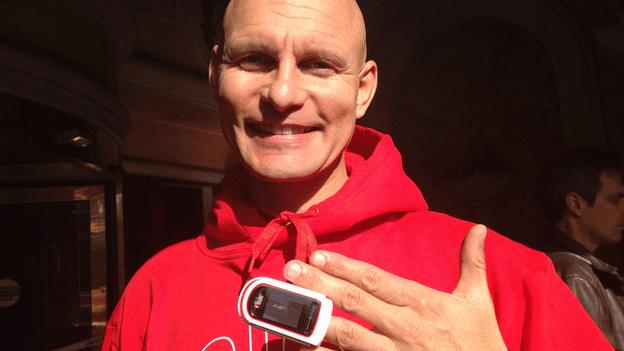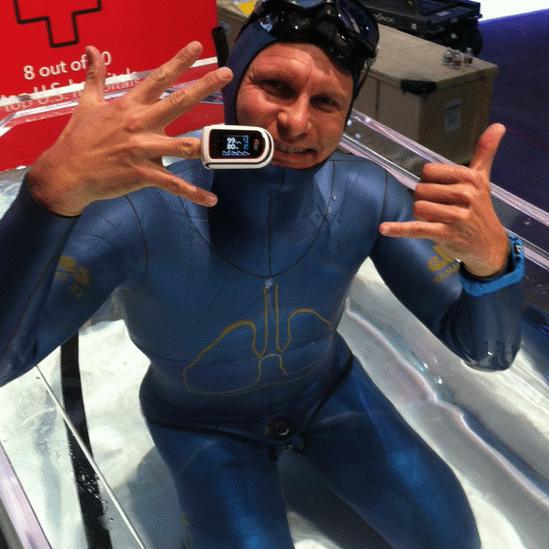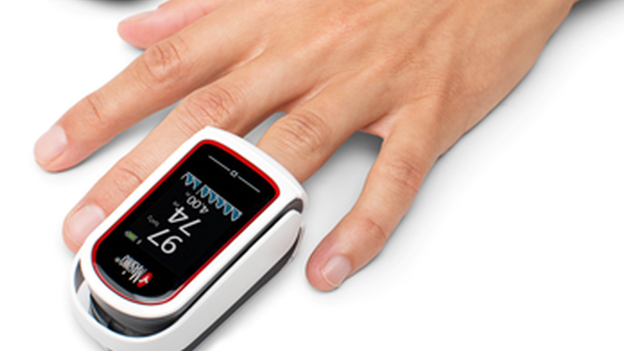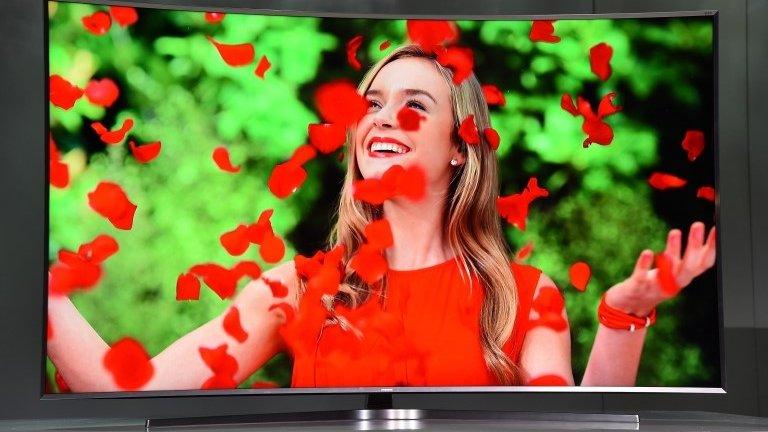CES 2015: Meet the man who 'doesn't breathe'
- Published

Mr Severinsen thinks the benefits of wearables outweigh the security risks
What is a man whose expertise lies in his ability to hold his breath doing at the world's largest gadget fair? Zoe Kleinman finds out.
Danish free-diving champion Stig Severinsen, who holds the world record for holding his breath under water, is perhaps an unlikely attendee at the Consumer Electronics Show in Las Vegas.
A passionate biologist who also studied medicine, Mr Severinsen, whose breath-holding record is 22 minutes, is in Nevada this week with a firm called Masimo as they launch a new wearable health-monitoring device, the MightySat.
As perhaps an "extreme user" of such tech, Mr Severinsen told the BBC that the benefits of wearable devices outweighed the security risks of storing the often very personal data they collected.
Health-monitoring tech looks set to be a big trend at CES this year, and there are plenty of devices here designed to track and collate your vital signs.
Unlike the more conventional wristband design, the Masimo model fits on the end of the user's fingertip and measures oxygen saturation as well as blood flow and pulse.

Mr Severinsen tests wearables in extreme conditions
Mr Severinsen decided to use the MightySat after testing two other monitoring devices, which he declined to name. He did admit that they were not robust enough to survive in the extreme conditions in which he dives.
One of his recent exploits involved swimming underneath an iceberg, and while he wasn't wearing the devices during the swim itself, the conditions on the surface were too cold for them to function, he believes.
"Training for extreme records under extreme conditions is always a huge challenge," he said.
"In such situations, it is of great value to be able to perform non-invasive and accurate measurements of my heart rate and oxygen saturation levels with a state-of-the-art device."
"Understanding what goes on inside your body is paramount to improving performance."
Security issues

MightySat will be competing with a glut of wearables at CES
The so-called quantified-self movement aims to incorporate technology and data collection into people's daily routines. By keeping track of your health, the theory goes, you can also keep one step ahead of falling ill.
Mr Severinsen believes that health monitoring has the potential to shift the focus of medicine more in the direction of preventing illness rather than the current method of treating conditions as they arise, "fighting fires" as he calls it.
"Very little is done in terms of prevention," he told the BBC.
Privacy experts remain concerned about how the firms that sell wearables make sure that the sensitive data they collect remains private.
Much of the data collected by health monitors including MightySat tends to be stored in the cloud.
Despite some high profile cloud data thefts in the past 12 months, Mr Severinsen remains relaxed about security issues.
"I wouldn't mind people stealing my heart rate data," he said.
"I've never had that Big Brother fear. You can do bad things with anything."
Masimo is very quick to point out that MightySat's data is encrypted.
"I'm not worried about security settings - nothing is safe in this world," Mr Severinsen added.
Mental barrier
The internet is the only platform he uses for all his work teaching his own "breathology" technique to corporate and private clients around the world.
"I move around all the time - I just want things to be accessible when they're needed," he said.
Mr Severinsen has trained himself over the years to hold his breath "comfortably" in the water for at least five or six minutes.
He admitted suffering black-outs, falls and even coughing up blood while perfecting his technique.
"The real challenge is the mental barrier - the urge to breathe," he explained.
"Breathing is the reflex of life, the strongest signal. You get through it with knowledge, learning to relax through the panic."
The desire to breathe stemmed not from a need for more oxygen but to expel carbon dioxide, Mr Severinsen added.
And if you've ever wondered what it feels like to get beyond that urge.
"Your heart rate drops… sometimes you get the urge to pee… and your heart starts to secrete hormones," he said.
"You don't want to think about time. The notion of time dissolves."
- Published6 January 2015

- Published6 January 2015

- Published6 January 2015
